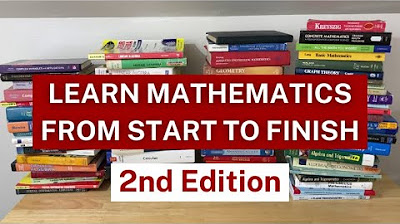It's Easier Than You Think
TLDRThe video script offers guidance for beginners seeking to learn mathematics from scratch. It emphasizes the importance of starting with the right resources, such as SAT workbooks, online courses, and books like 'Intermediate Algebra for College Students' by Angel and 'College Algebra Essentials'. The speaker shares personal experiences and recommends a consistent daily approach, suggesting at least one math problem per day to build a strong foundation and improve over time. The video encourages persistence and highlights that it's never too late to start learning math.
Takeaways
- 📚 Start with a clear goal in mind, such as preparing for the SAT or obtaining a degree in math.
- 🌍 Consider your location and available resources, like local colleges or online learning platforms.
- 📈 Use SAT workbooks for targeted exam preparation, especially if you have specific tests in mind.
- 🎓 Look into free online resources like YouTube videos for a wide range of math topics.
- 📖 Choose structured courses or books over random videos for a more organized learning experience.
- 🔍 Start with 'Intermediate Algebra for College Students' by Angel if you're returning to math after a gap.
- 📘 If you have some algebra background, consider starting with 'College Algebra Essentials' for a more advanced start.
- 📚 Pair courses with corresponding textbooks for an integrated learning experience.
- ⏰ Create a daily math routine, aiming to solve at least one problem every day to build consistent habits.
- 🌟 Be open to adjusting your study hours based on your motivation and energy levels each day.
- 💪 Maintain a growth mindset and remember that it's never too late to start learning and improving in math.
Q & A
What is the main challenge faced by someone starting their math journey from scratch?
-The main challenge is determining where to start, how many hours a day to study, and which sections to focus on in order to effectively learn mathematics from the ground up.
What advice does the speaker give for preparing for the SAT?
-The speaker recommends using an SAT workbook, which can be found on Amazon or other similar platforms, as the best way to prepare for the SAT.
How does the speaker suggest one should approach learning math if they are starting from nothing?
-The speaker suggests that individuals should either watch free videos on the internet, sign up for online courses, or invest in books as effective ways to start learning math from the ground up.
What is the significance of the book 'Intermediate Algebra for College Students' in the speaker's math learning journey?
-The book 'Intermediate Algebra for College Students' is significant because it is recommended as a good starting point for those who are not very confident in their math skills or who have been away from math for a while. It is designed for college students and provides a solid foundation for further mathematical studies.
How does the speaker approach the idea of setting aside a specific amount of time for studying math each day?
-The speaker suggests that instead of setting a rigid time goal, such as two hours per day, it's more effective to commit to solving at least one math problem every day. This approach is more flexible and helps maintain consistency even on days when motivation is low.
What is the speaker's perspective on the role of luck in achieving success?
-The speaker believes that luck plays a significant role in success, but it is also influenced by hard work. The more one works, the more opportunities arise, effectively increasing one's luck.
What is the speaker's advice for maintaining a consistent study habit in math?
-The speaker advises doing at least one math problem every day to ensure consistent progress and to make every day a productive one in terms of math learning.
What are the resources the speaker recommends for someone looking to learn math?
-The speaker recommends free online videos, online courses, and books such as 'Intermediate Algebra for College Students' and 'College Algebra Essentials'. Links to these resources can be found in the description of the video.
How does the speaker describe their own math learning journey?
-The speaker describes their math learning journey as accidental, starting with intermediate algebra and eventually leading to a computer science degree. They emphasize that it's never too late to start learning math and that hard work can lead to more opportunities and luck.
What is the importance of having a physical math book according to the speaker?
-The speaker believes that having a physical math book is beneficial because it provides a tangible learning experience. Being able to touch and feel the book can make the learning process more enjoyable and engaging.
What does the speaker suggest for someone who feels it's too late to start learning math?
-The speaker encourages individuals who feel it's too late to start learning math to simply begin anyway. They emphasize that it's never too late and that taking the first step is what matters most.
Outlines
📚 Starting a Math Journey
The speaker begins by addressing a question about learning math from scratch, emphasizing that the approach depends on the individual's time availability and current math level. They share an email from a subscriber named Abdu Wahab, who seeks advice on restarting their math learning journey to prepare for the SAT and a math degree. The speaker suggests that for SAT preparation, a workbook would be beneficial and shares personal experiences with learning math, including the use of online resources, courses, and books. They recommend starting with 'Intermediate Algebra' for those who need to build up their math skills and 'College Algebra Essentials' for those with some math background.
📖 Choosing the Right Study Materials
In this paragraph, the speaker delves into the selection of appropriate study materials for learning math. They recommend the book 'Intermediate Algebra for College Students' by Angel for those who need to strengthen their foundational math skills. The speaker also suggests that for those with some algebra experience, 'College Algebra Essentials' could be a better starting point. They explain that books are valuable resources because of their tangible nature and the structured layout they provide. The speaker shares personal anecdotes about their own math learning journey, highlighting the importance of starting with the right course and book for one's level.
🎯 Daily Practice and Consistency
The speaker emphasizes the importance of daily practice in math learning. They suggest that instead of setting a rigid goal of studying for a specific number of hours each day, it's more effective to commit to solving at least one math problem daily. This approach is more manageable and can lead to a consistent study habit. The speaker explains that even on days when one lacks motivation, the minimal goal of one problem can often lead to completing more, as it overcomes the initial resistance to start. They conclude by encouraging the subscriber, Abdul Wahab, and others in a similar situation to maintain a positive attitude towards learning math and to take consistent, daily action towards their goals.
Mindmap
Keywords
💡Mathematics
💡Learning from the ground up
💡SAT
💡GED
💡Online courses
💡Textbooks
💡Study habits
💡Motivation
💡College degree
💡Self-paced learning
💡Consistency
Highlights
The video provides advice on learning mathematics from scratch, tailored for individuals with limited prior knowledge or experience.
The speaker shares a personal story of receiving an email from a subscriber named Abdu Wahab, who is seeking guidance on learning math from the ground up.
Abdu Wahab's goal is to prepare for the SAT and obtain a degree in math, having faced personal challenges and starting his math journey later in life.
The speaker acknowledges the challenge of the SAT and recommends using workbooks for preparation, sharing a link to an SAT workbook in the video description.
For learning math up to a college level, the speaker suggests using online resources, such as free video tutorials, and emphasizes the importance of structured learning through courses or books.
The speaker recommends their own website, mathsorcer.com, for courses and guides, specifically suggesting the College Algebra course for those looking to advance in math.
Books are highlighted as an excellent resource for learning math, with the speaker sharing his personal preference for the tangible experience of working through a physical book.
The speaker suggests starting with 'Intermediate Algebra for College Students' by Angel for those who need to build a strong foundation in math.
For those with some algebra background, the speaker recommends 'College Algebra Essentials' as a next step, providing a more comprehensive and advanced understanding of algebra.
The importance of a daily math practice is emphasized, with the speaker suggesting doing at least one problem every day to build consistency and momentum in learning.
The speaker shares his personal philosophy that it's never too late to start learning math and that hard work can create opportunities and 'luck'.
The video encourages setting small, achievable goals, such as solving one math problem daily, as a strategy to overcome lack of motivation and maintain progress.
The speaker provides a link to his fitness channel for those interested in fitness content, showing his versatility in content creation beyond mathematics.
The key takeaway from the video is to start learning math by doing at least one problem every day, emphasizing the importance of consistent, daily practice.
Transcripts
5.0 / 5 (0 votes)
Thanks for rating:





